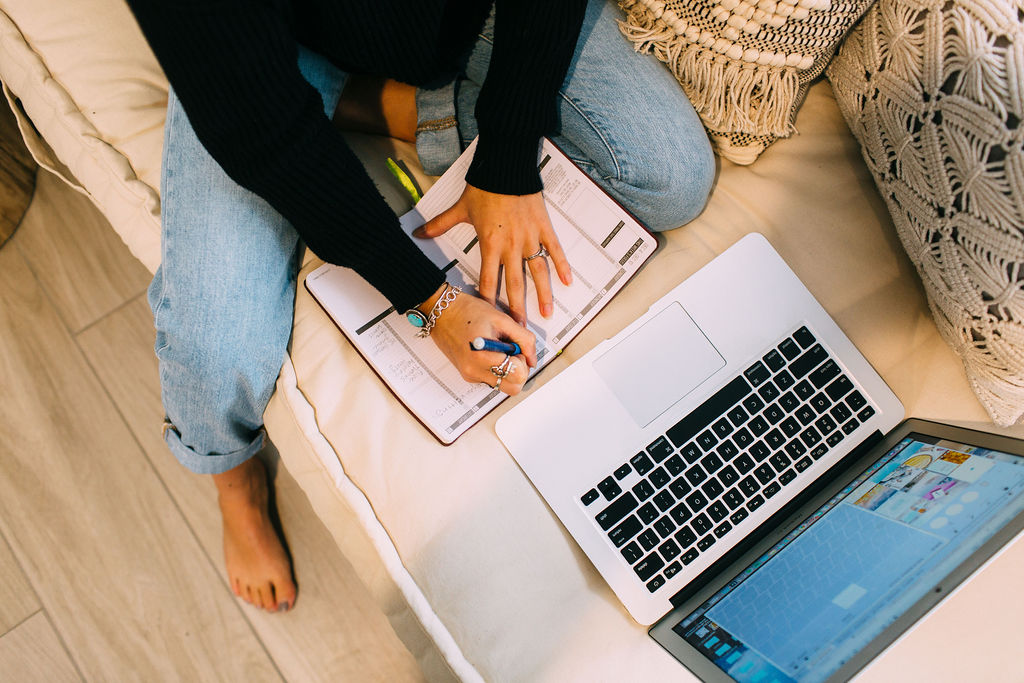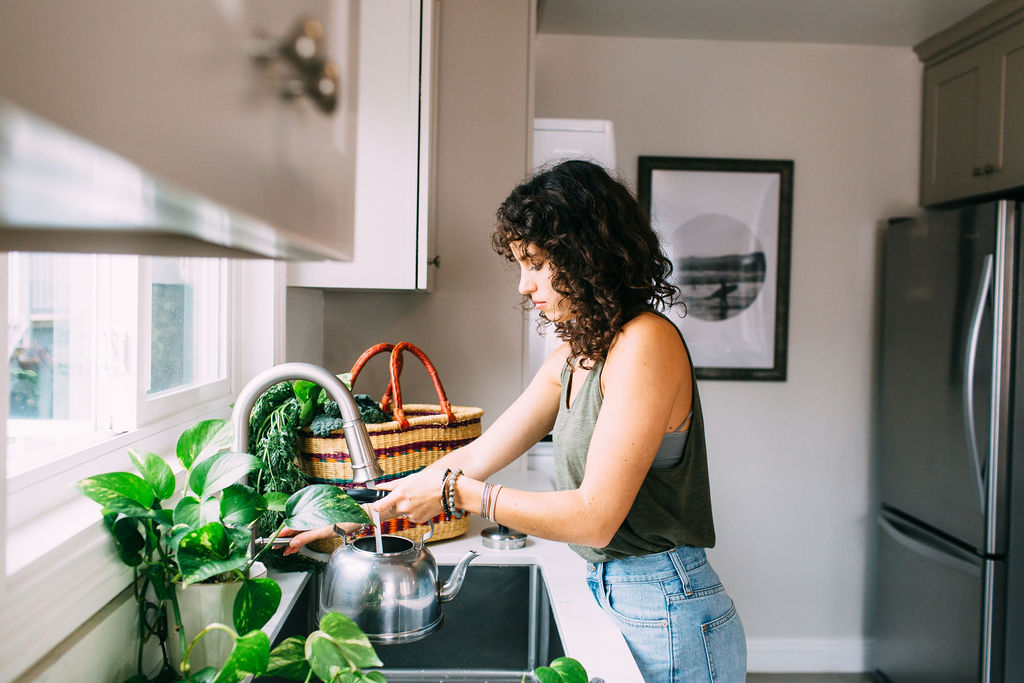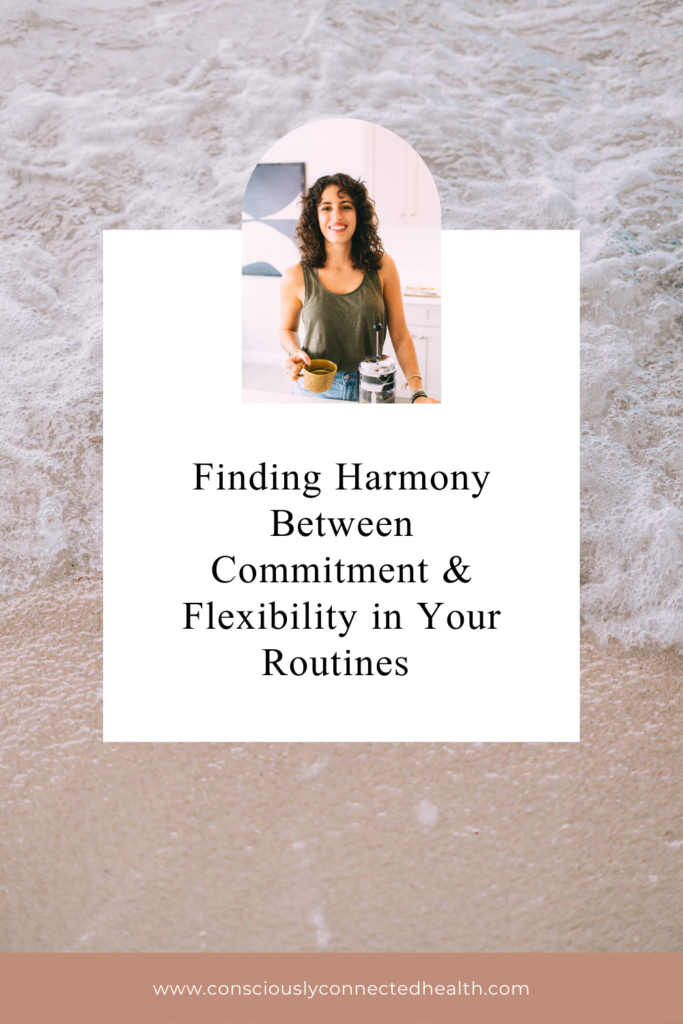I wanted to better understand your challenges when it came to routines, and so I asked on Instagram what you struggle with most. The top two responses were: staying committed and following through (not surprising), and being too rigid and inflexible. These two experiences might seem like complete opposites, but are actually closely linked. Let’s dive into some important mindsets and practical tips to support finding harmony between commitment and flexibility in your routines.

The Struggle
It’s common to experience routines in one extreme or another: either fully devoted to the point of being inflexible and adjusting everything in your life to revolve around your routine, or being too loose and detached to any structure or accountability resulting in an inability to follow through.
But why do we find ourselves bouncing back and forth or stuck on either side or this spectrum?
There’s a few reasons to explore here:
- Insecurities, fears and limiting beliefs –
- You might have deep rooted insecurities and beliefs about yourself that limit what you believe is even possible. If you don’t believe in yourself and allow yourself to dream, then setting goals, finding motivation and taking inspired action is going to be a challenge. Limiting beliefs, degrading self-talk, and paralyzing fears, can keep you playing small, questioning yourself, and stuck in extreme patterns of behavior to prove the belief/fear either right or wrong. Maybe the thoughts that circle in your mind are that you’re not enough, not capable, worthless, fat, lazy, a disappointment, afraid of change, afraid of getting uncomfortable, afraid of staying the same…. All of these might keep you in constant action or inaction, or continually at war with yourself.
- Besides personal limiting beliefs, you might also have beliefs about routines in general, such as they need to stay consistent no matter the circumstances, or they need to be done perfectly to be of any benefit. It’s natural to be influenced by others, especially if you view them as the expert in a certain topic or look up to them for inspiration and guidance. But sometimes this results in us either consciously or unconsciously adopting their opinions and beliefs as our own. Have you stopped to question if those beliefs actually support your needs and goals, or if they only create unnecessary pressure and unrealistic expectations? Do these beliefs around routines limit your experience with them, and restrict your personal joy and freedom?
- You may also just be highly motivated to better yourself and create a change, and there’s nothing wrong with that! But if it’s causing you to be so inflexible with your routines and your life, there’s likely a limiting belief, fear, or insecurity driving that motivation and keeping you on such a rigid path.
- Change is hard and habits take time –
- Creating new thought and behavior patterns takes TIME. We know this! How much time exactly? It’s been reported a minimum of 21 days, an average of 66 days, up to 8 months…. And honestly I wouldn’t recommend getting stuck on a number because the experience is going to be highly personal. This is another opportunity to check your expectations: are they realistic and supportive of your mental and emotional health? It does take repetition, consistency, and intentional action to retrain your brain, so don’t give up. But also remember to meet yourself where you’re at with kindness.
- Change is often hard, and that’s the truth. It requires you to leave the safety and comfort of familiarity, to step into something new that may be completely unknown. Remember that change also takes time? Your current thoughts and actions are habit for you right now, and changing those deeply ingrained habits requires you to constantly choose differently. When it all gets too hard, or fears and limiting beliefs arise, it can be easy to find yourself taking a few steps back, or giving up altogether.

Some practical tips for staying committed:
- Choose a regular cadence for your routine
- Schedule it into your planner, calendar, phone, etc.
- Keep your intention, motivation, vision, etc. easily accessible and look at it regularly (Write it out within a few sentences or a mantra, create a vision board, etc.)
- Determine how you need to be held accountable – a checklist, an alarm on your phone, physical reminders in your space, an accountability partner, etc.
- Identify your areas of struggle and support yourself however necessary to set yourself up for success
- Start small and take things one step at a time
- Stick to the basics
- Tweak your routine to YOU – to support your needs, your personality, your vision, your wants, etc.
- Stick to what you enjoy and aligns with your goals/vision
Some practical tips for staying flexible:
- Track and align your lifestyle and routine with your menstrual cycle
- Regularly create time to be with yourself, to cultivate a strong self-connection and intuition (this will be the foundation to be able to tune in with yourself and act on the messages you pick up on)
- Regularly check in and see how your energy is and what your mind, body and soul need.
- Create categories for your actions such as movement, personal hygiene, self-connection, food/nourishment, etc.. Then allow yourself to choose what feels right in the moment. For example, one day you might choose a walk vs. strength training for movement, or meditation vs. journaling for self-connection. Keep your options open!
- Regularly try new things to keep things interesting and to see what works best for you.
- Have a monthly check-in/review with yourself and your routine. What’s working, what’s not working, and how do you want to pivot moving forward?

Finding harmony between commitment and flexibility
Sounds great right? But how do you actually cultivate and experience that harmony? Let’s go through some helpful tips and perspective shifts:
- Get clear on your foundational pieces to keep you grounded and connected to yourself and your needs: why even have a routine in the first place? What is your personal motivation and reason for wanting a specific routine? Put your blinders up to what everyone else is doing, and tune into YOU. It’s so important to create and start from this strong foundation to help guide your actions.
- Identify and explore your current beliefs, expectations, fears, etc. in relation to yourself and specific to routines. What are they? Where did they come from? How are they holding you back? How might they be helping you? Go in with curiosity and simply seek to understand with non-judgmental awareness. Get it all out in the open so you know exactly where you’re starting from and what you’re working with.
- After creating all that awareness, decide for yourself what’s serving you and what’s not. Is there anything you’re ready to drop and release? Maybe a belief that routines require perfection? Some things may need to be deeply acknowledged and processed, which you can certainly do over time through journaling, meditation, therapy, movement, reiki, EFT Tapping, and other energetic and somatic practices. But you can at least begin by identifying that which isn’t serving you, and choose in this moment to make room for more peace, joy and freedom. It all starts with awareness and a conscious decision.
- Open yourself up to new perspectives around routines. Here’s some powerful ones I’d like to share with you:
- Change and new habits take time. Let this fact be a weight off your shoulders; acknowledge any pressure you’re putting on yourself to be successful in a certain amount of time, and give yourself permission to release. Isn’t it freeing to know it will take time and there’s no rush?? Embrace the slow journey!
- Doing something different can be a huge adjustment. It’s not always easy to actively choose something different from how you usually think or act. Give yourself grace and know the journey may have more twists and bumps along the way than you originally expected. Choose to navigate the unexpected and challenging moments with compassion and patience.
- Creating a routine, experiencing change, and health are all a process, not an event or destination. It’s a continual journey; there is no end point where everything becomes perfect and where you can stay forever.
- It might take trial and error to find what works for you. Approach your routines with a playful curiosity, and know that you have the power to choose whatever suits you and your needs.
- Life is in constant motion. As your life and the world around you changes, your needs and desires are likely to change with them. Shouldn’t your routine change to support your shifting needs? Welcome that change, and provide yourself an opportunity to pivot and do things differently whenever you feel the need.
- You are completely unique. Your personality, the way you function, your preferences, your life circumstances…all these things play into how you experience everything in your life and how you make decisions. Don’t compare your journey to any one else’s, because you’re not on the same path, nor are you the same person! Do your best to not judge your unique experience and your process.
- It’s not all-or-nothing. Any action you take can have a positive effect and be of benefit if you let it. Something is better than nothing, right? Forward progress is forward progress; don’t dismiss your achievements no matter how small they may seem to you.
- There’s no right or wrong way to do a routine. Find what works for YOU. I can not stress this enough.
- Routines don’t require perfection. Mistakes? Unplanned circumstances? These things aren’t bad and shouldn’t be feared. How can you learn from them? Greet them with compassion and curiosity, and stay focussed on what is in your control in the present moment.
- Choose to view your routine as an act of self-care and love, rather than a chore or something on your to-do list. Choose to view it as a beautiful opportunity to support yourself, and watch your relationship to your routine shift.
- It’s YOUR life. You get to decide how you live it. Need I say anything more?
- After expanding your mind and awareness to new perspectives, make sure to lean into the control you have. I hope you feel incredibly empowered by the fact that you get to make your life how you want and need it to be, and you’re the one responsible for creating the changes you seek. Routines are about supporting you and your needs, so if the routine needs to shift or look different day to day depending on what you’re feeling, there’s no rule that says it can’t. Maybe you prefer more structure and accountability, or maybe you thrive in a more open, flexible environment where you have freedom to choose moment by moment. Maybe 5 weeks down the line, you might need something completely different than you do today. Invite a sense of playful flexibility to your routines, making room for joy and deep soul nourishment. You’re in control.
Yes, creating new habits and working towards goals require consistency and commitment. But what if instead of being committed to the actual routine and associated actions, you commit to supporting and showing up as your best self? What if you commit to the bigger picture and vision you have for yourself and your health? What if you seek to simply support your overall well-being? When you center in on your vision, and how you want to feel and show up in each moment, you can work from there to determine the things that facilitate that (which might change over time or even day to day). Do you see how that creates less pressure on the actual routine, and allows for more freedom of choice and flexibility? Commit to yourself, rather than your routine, and the routine and actions will flow more easily. Let your routine serve you, not the other way around.
For example, there’s likely a few things that can support you feeling grounded and calm, if that’s your goal. Can you give yourself permission to choose what feels right in the moment to facilitate that? Or maybe deep down you know that a daily walk always provides you with the clarity and peace you need, and so you choose to stay committed to that.
Instead of full commitment, or none at all, what if you drop the rules, and solely seek to support yourself? Keep the big picture intention in mind, and take action that aligns with supporting that. A routine is just a tool… you can use it how you want.
I hope this has been helpful; I’m sure your mind is buzzing with all this new perspective and information! Take time to integrate it, and play around with what works for you.
Routines are great for structure, stability, efficient use of time, accountability, etc., but I think it’s equally important to meet yourself where you’re currently at and honor your needs in the moment.
The key to finding harmony between commitment and flexibility in your routines is to keep your personal reason for having your routine and vision for yourself front of mind, so that you are always connected to this strong foundation and can easily take aligned action. It’s a balance of holding the vision, and honoring both your commitments to yourself and your needs in the moment. This also requires you to learn how to discern between your true needs and your ego – are you actually tired and need rest, or is that your ego whispering in your ear that you’re not good enough?
Fill your routine with things that make you feel GOOD in body, mind and soul. If not, why even do it? What’s the point? As mentioned, there’s more than one way to manage stress or to nourish your body – choose what you enjoy. Tap into your heart, and what you’re needing at the soul level. Allow your routine(s) to be a revolutionary act of self-care and love.
To explore more on the topic of routines, check out these blog posts:
- Wellness Benefits of Having Routines
- Why Routines Might Change, and How to Stay Flexible and Adjust
- How to Create a Strong Foundation and Framework for Any Routine
- Inspiration for Creating Your Own Routines


Be the first to comment